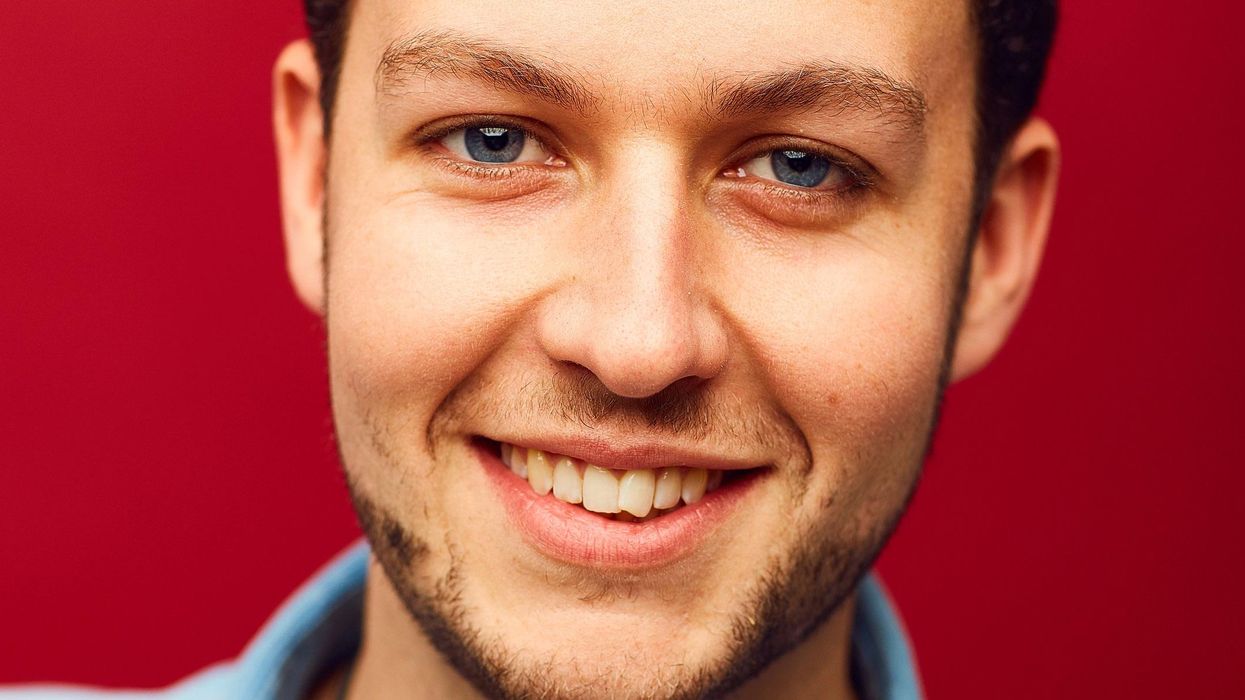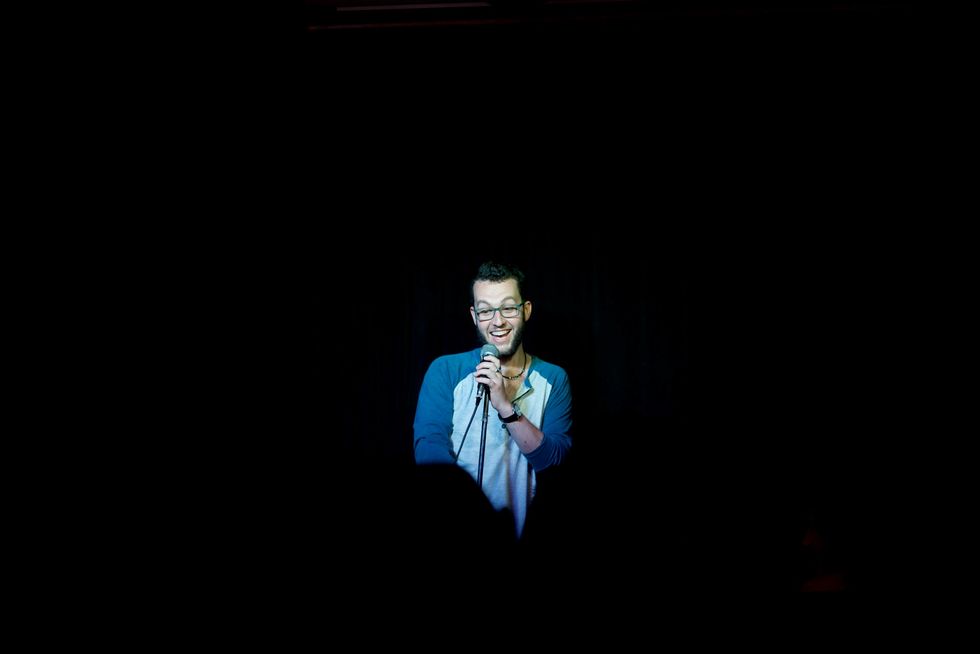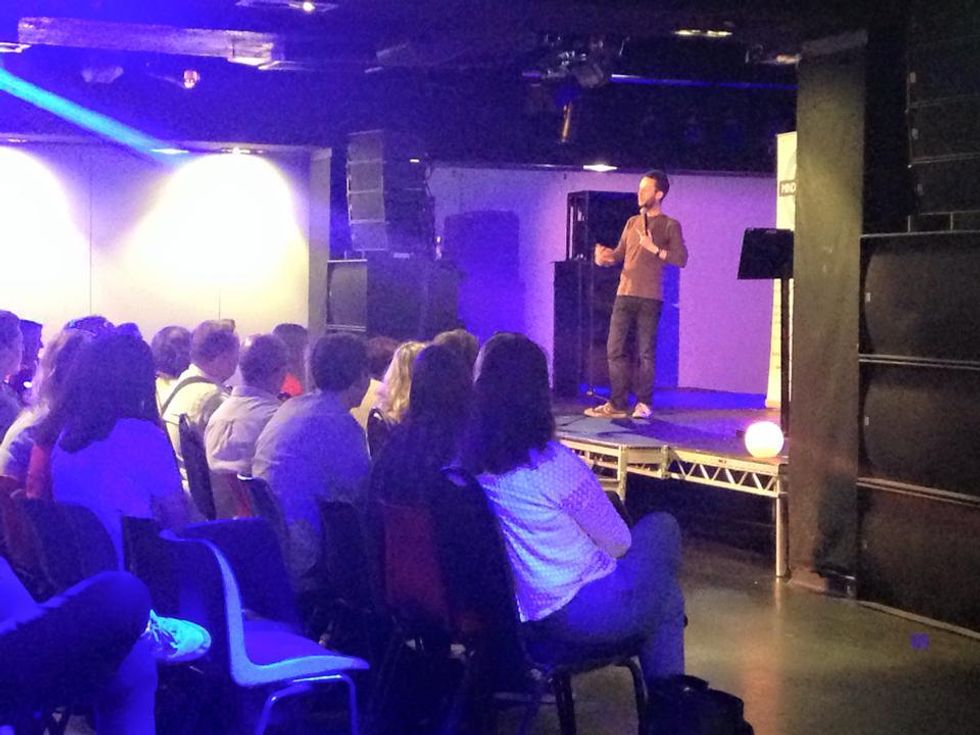Celebrities
Mimi Launder
Jun 16, 2018

For stand-up comedian Dave Chawner, anorexia is the world with the laughter sucked out.
“To me, laughter is coping,” said Dave, whose quirky, moving and hilarious new book Weight Expectations - coming off the back of his show Normally Abnormal - is not what you’d expect from chronicles of one man’s battle with mental illness.
But then you probably wouldn’t think a stand-up comedian’s bread-and-butter could be be anorexia either. Yet from shows on the Fringe to pubs and clubs, Dave has made a living sharing a giggle about the least funny of subjects.
“Humour is me at my best, and it lets me try and give that to other people too,” Dave told indy100. After all, sa he lays out in the first page of his book, “eating disorders are serious, but that doesn’t mean we have to be”.
Comedy is Dave’s antithesis to anorexia, an illness that makes Dave take life “far too seriously” (“faaaaar too seriously”, he added again):
When I have a bit of a laugh, and a bit of a joke around, it’s probably a sign I’m more stable.
Comedy offered Dave a clear-cut identity after the well-trodden teenage struggle of 'who am I?'.
Comedians are characters, David explained, for example, everyone knows Alan Carr’s feelings on football before even asking. “It bewitched me,” said Dave, adding:
It’s that feeling of consistency: that if you chop them up, they’ll be exactly the same right the way through and I thought ‘this is beautiful’. I was obsessed by it.
Stage allows - even demands - performers to be a “freak” with “no dignity to lose”. So, Dave took up comedy while studying at Southampton University, using it to explore his mental illness.
He struggles to find an enthusiastic enough description for his early and continuing love for comedy, grappling with the right word before landing repeatedly on “beautiful”: it lets you take “something so dark and putting it in a more palatable way”.
“But truth is no excuse not to be funny”, Dave is keen to point out. If anything, you need to be funnier. But if his shows do ever bomb (“which of course they do!”), then “at least I can say I’ve been honest at worst”.

Now, Dave has swapped stage for the page. Likewise, he wants Weight Expectations to acknowledge his flaws, stay away from self-promotion and be wary of telling another sob story (“there are enough of those out there!”).
Instead of glamour and polish, Dave aims to offer exactly what he needed to hear aged seventeen, when he first started struggling with anorexia: hope, from someone who has lived through it, and humour - to show that talking about anorexia “doesn't have to have that self-pitying, depressing tone attached to it".
I didn’t need a thesis from a professor and I didn’t need some BBC panorama. I just need to laugh about it. I need to know that ‘yeah, you do have anorexia, or you have broken your foot, but it’s not the end of the world. You can get through this’.
Above all, this is a book for everyone, said Dave: “I don’t think eating disorders are that alien to understand”. If you’ve ever wallowed to music, if you’ve ever struggled with romance, if you’ve look ever looked at the number on the scales as if it’s judgement day, if you’ve ever in appropriately giggled, if you’ve ever felt ashamed, if you’ve ever struggled with mental illness or known someone who has.
Dave can let go of any niggling worry that he hasn’t succeeded in warts-and-all authenticity that he needed as a teenager - and that's not just because of the song recommendations at the beginning of each chapter, which he freely admits basically match the "music taste of a prepubescent girl”.
Between telling me his illness made him a “prick and horrible to live with” and Weight Expectations detailing a gut-wrenching obsession over calories, the star of this sweary, colloquial book is not “someone you see splashed over TV”, but painfully real.
With realness comes the addictive nature of losing weight, the ‘winning’ - but also dulling yhe senses and the numbness left behind; the gnawing and constant companion of hunger; and the sacred ritual of finding a bathroom, drinking a glass of water and switching your phone onto airplane mode before you can eat.
“Anorexia is seen as a sexy disease, but actually it's so boring,” Dave told me, giggling a little as if we were discussing a tedious lecture. He added:
The actual day-to-day sitting around and thinking about not eating is so dull, so fucking dull. It's not talking about the celebrities that have them, it's talking about the real mudanity of it and the inability to cope and the longterm problems that will fuck you up.
Society drills into our head that thin is good, fat is bad, beyond just looks - and while anorexia was partly to do with Dave’s aesthetic, it was not to do with his appearance, but about blending in, searching for identity, the numbness of starvation and the euphoria of hitting targets, he explained in his book. He told me:
I'd been trained to think that getting thinner makes you better, that getting thinner was a way to be more worthwhile.
It wasn't about trying to look good for the prom, it wasn't about trying to get a girlfriend, it was about trying to be someone that people would want to be around.
That's a really hard balance to get. I understand that at source that's about how you look, but actually underneath all of that it's about what I am worth.
This obsession with weight, thinks Dave, extends to the medical community and needs to be changed in order to lower the obstacles to treatment.
Nerves before Dave’s first medical assessment - yes, actually the word they use - came in part from not feeling ill enough to do with the treatment, feeling under-qualified, feeling too heavy to be anorexic.
After his last therapy session, he was told to hop on the scale amd his therapist said: ‘I don’t know how to tell you this, but it says that you’re technically overweight!’
Weight-obsessed news articles about eating disorders also failed to motivate him to recover: the people “minutes away from death, weighing less than a bag of crisps, fainting at every turn… “
Dave’s illness was less dramatic, leaving him scared that it was also less worthy.
When he was diagnosed with being serenely clinically anorexic, only then did he think “now I’m qualified to get better”. Even when stepping into the spotlight on stage in previous years, he thought:
‘If you want to talk about this, you’ve got to get down to a lower weight or a lower calorie count, even though it’s not about your body, it’s about your mind’.
“It’s a huge problem,” said Dave, “and something we’re campaigning to hopefully help change in the future”.
Rather than fear, inspiration can be far more motivating to get treatment.
Instead of saying to people 'you've got to lose the anorexia', saying 'you're getting your life back', 'you're getting that fun, that enjoyment that vivacity - whatever it is you wanna get - getting that back is so much more of an incentive. Because if I say to you I'm going to take something from you, your reaction will be 'please don't'.
After all, with treatment you're bound to get therapy, which is “fucking great, amazing fun”. He added: “I don't understand what people don't like about it. An hour a week to talk about nothing but myself?”
Recovery, of course, is a process. Even when writing the book, Dave felt a blip and returned to antidepressants.
But the book now "feels like at turning point", partly due to its “squeaky clean” permanence.
Now, instead of fearing a relapse every time he talks about eating disorders, the responsibility Dave feels is to staying healthy.
I'm always going to try and want to try and champion people. However, instead of being someone who just lived it, I think I want to be someone who's lived through it now, someone that had it rather than someone that has it, bringing a message of hope.
Weight Expectations is out on 21 June 2018.
More: 13 things you should never say to people who suffer with mental illness
Top 100
The Conversation (0)














